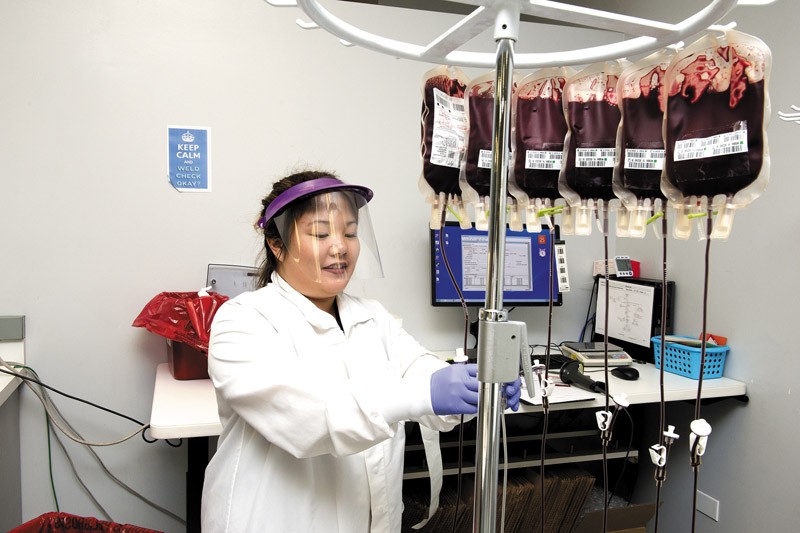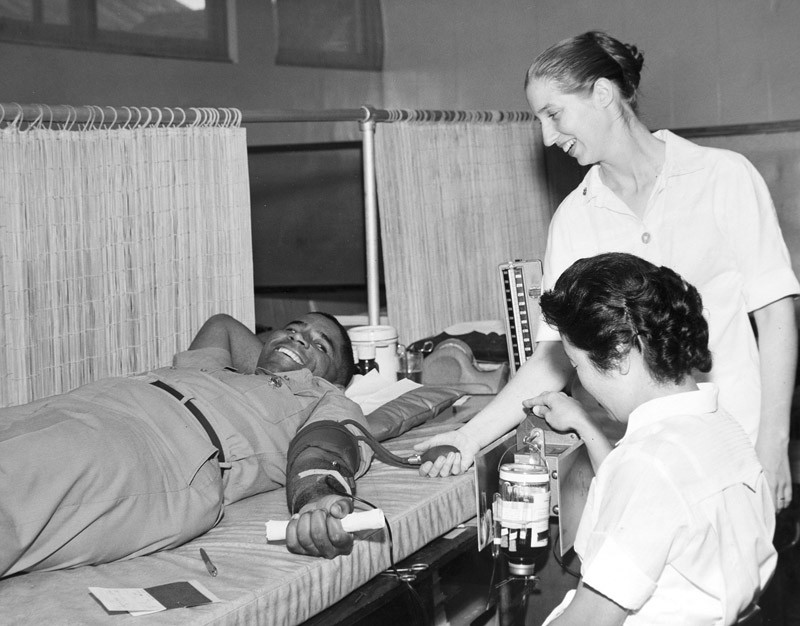Zapping The Zika Threat
Blood Bank of Hawaii starts a new screening procedure in September to ensure donated blood is virus-free
Summertime and our blood supply is easing. It’s nothing to sing about, and the Zika virus threat is adding to the blues.
That’s the refrain from Blood Bank of Hawaii, the state’s pipeline to life-sustaining fluid critically needed by hospitals and emergency facilities. Complicating its mission are recent global epidemics and infectious diseases, such as dengue fever and Zika.
Hawaii’s recently launched “Fight the Bite” campaign aims at keeping the Islands free of diseases spread by mosquitoes. It underscores the need for safe blood collection and screening. Fortunately Blood Bank of Hawaii (BBH) is in tune with that and is responding proactively.
In September, BBH starts a new screening procedure to ensure blood collected is free of the Zika virus. The process, developed by Grifols, a leader in blood-screening technologies, is approved for testing by the U.S. Food and Drug Administration.
“Zika virus poses a significant threat to blood safety and adequacy of our blood supply,” says BBH president and CEO Kim-Anh Nguyen, M.D., Ph.D. “The global Zika epidemic now encompasses the South Pacific and is highly likely to reach Hawaii, where shutting down blood collection could devastate local blood supply.
“It is our responsibility to be proactive for the good of the community’s public health,” she states. “Our participation in clinical trials also provides valuable data to researchers to better understand the Zika virus and prevention strategies.
“This puts Hawaii in the forefront globally.”
World Health Organization has declared the Zika virus a global public health emergency. Doctors have described it as a “pandemic in progress.”
The virus can be transmitted by mosquito bites, sexual contact or from a pregnant mother to her baby. Infection can cause miscarriages, severe birth defects and death.
State health director Dr. Virginia Pressler observes, “Mosquito season in Hawaii is year-round, but with increased travel and more outdoor activities during the summer months, we need to be on our guard and keep residents and visitors well-informed about mosquito-borne diseases and how to reduce the chances of outbreaks in our state.” (See sidebar: “Zero In On Zika.”)
BBH’s response to Zika is typical of the vital role it has played in Hawaii since 1941. Marking its 75th anniversary, it merits a look at the organization that responds to epidemic outbreaks and the urgency of someone needing blood every two seconds.
As Nguyen puts it, “It doesn’t get more visceral and altruistic than that.”
Out for Blood
Facing tumultuous health care reforms, blood banks of today and tomorrow must transfuse or bleed irrelevance. Once an extension of medical practice, they have become pharmaceuticals that help medical professionals cure, treat and analyze health conditions and diseases.
Every day in the U.S., about 40,000 units of red blood cells are required in hospitals and emergency treatment facilities for patients with cancer and other diseases, for organ transplant recipients and to help save the lives of accident/trauma victims. In Hawaii, 200 donors are needed every day.
Yet only 10 percent of eligible blood donors roll up their sleeves and give something of themselves, literally, to help the lives of others.
The resistance comes partly from fear and darn right squeamishness about the sight of blood or use of needles.
These are largely psychological factors, Nguyen points out. Top among the reasons for not donating are:
• “I wasn’t asked. They don’t really need me.”
• “I’m not eligible. Too young, too old, have health conditions or tattoos that preclude me from donating.”
• “I’m scared of needles. It hurts.”
• Cultural or religious beliefs
Blood Shot
Hawaii’s diverse population adds uniqueness to BBH’s stewardship of blood supply. Some of the most rare blood types are found in Hawaii, particularly among Asians and Pacific Islanders. Blood types O+ and A+ are common here and always in demand.
As a local neurosurgeon commented after touring BBH’s Young Street donor center, “I never knew all the work it takes for blood to get here. Without blood, brain surgeries could not occur.
“Not having a safe and reliable blood supply is a show stopper,” he declares.
Anyone who’s experienced a family member or friend needing blood, platelets or plasma can attest to human blood being a gift of life. There is no substitute for it, and it cannot be generated artificially.
People who receive the most blood include those:
• being treated for cancer
• undergoing orthopedic surgeries
• undergoing organ and marrow transplants
• undergoing cardiovascular surgeries
•being treated for inherited blood disorders.
What started out in the early 1900s as vein-to-vein transfusions has evolved to modern sterile processes with new testing protocols and donor procedures. The advent of single-use plastic bags in 1960s changed blood collection forever. The focus today is on blood management practices aligned with medical advancements and technology (less invasive surgeries) affecting blood usage.
Not in Vein
Transfusions are down almost one-third over the last five years, according to American Red Cross. With minimally invasive techniques like laparoscopic surgery and other shifts in medicine, demand for blood continues to drop despite population growth and a soaring number of people over 65, who have the most surgeries requiring blood, reports The New York Times.
Even at reduced levels of demand, Nguyen points out, blood banks need donors every day.
“Blood is highly perishable,” she says. “It is not a pharmaceutical that can sit on the shelf for 12 months or 18 months.”
Red cells have a life of 42 days; platelets last five days. Hence, blood centers are changing from a collect-as-much-you-can mentality to a collect-what-you need stance.
Hospitals must stock a variety of blood types to not to run out of any category.
The blood bank is the only game in town when it comes to collecting and storing precious blood for essential uses at 12 hospitals statewide. If this supply channel has a shortage, Hawaii’s isolation
is a life-and-death barrier to survival and sustainability.
Investing in the bank — depositing blood — is the only way it can dole out lifesaving dividends to residents.
For more information on donation locations and blood drives, call 848-4770.
Blood Bank of Hawaii technical services lab assistant Kelsey Nakamura at work
ZERO IN ON ZIKA
1) Zika spreads through infected mosquitoes. You also can get Zika through sex.
Hawaii has the type of mosquitoes that can spread Zika virus.
2) Prevent mosquito bites.
• Use EPA-registered insect repellent. It works!
• Wear long-sleeved shirts and long pants.
• Stay in places with air conditioning or window and door screens.
• Remove standing water around your home.
3) Zika is linked to birth defects. Infection during pregnancy can cause a serious birth defect called microcephaly that is a sign of incomplete brain development. If you are pregnant and have a male partner who lives in or has traveled to an area with Zika, use condoms or do not have sex.
4) Pregnant women should not travel to areas with Zika. Talk to your health care provider first and strictly follow steps to prevent mosquito bites.
5) Returning travelers can spread the virus. Zika virus can stay in your blood for about a week. When a mosquito bites you, the infected mosquito can then bite other people, who then are infected.
Source: Centers for Disease Control and Prevention.









